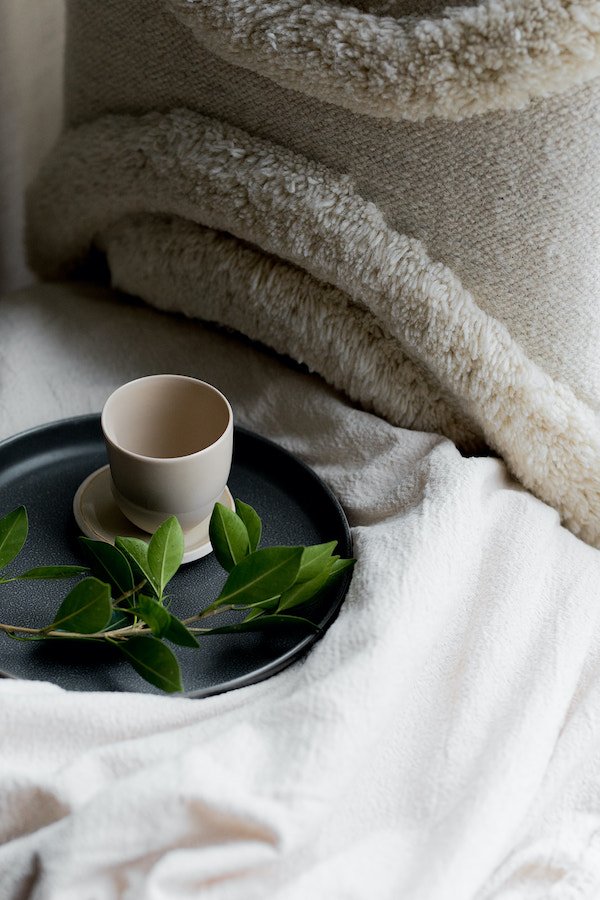
99 Ways To Get Better Sleep
Just like a healthy diet and exercise, sleep is an integral part of our well-being. According to the National Heart, Lung, and Blood Institute, quality rest helps healthy brain function, maintains physical health, and reduces our risk for long-term health problems. In fact, sleep can affect our heart, memory and cognitive thinking, metabolism, immune system, and everything in between…especially if we don’t get enough. (Here’s the recommended amount of sleep per day based on your age range, averaging 7-9 hours/day for adults.)
That’s why we’re all about getting the best possible R&R every night.
Of course, it’s not always as easy as jumping into bed and counting sheep (though we’ve tried). Sometimes, whether due to life stressors, hormonal imbalances, or time changes, among other factors, getting a good night’s sleep can be elusive.
If you’re struggling to sleep, consider these 99 tips below—from the most common suggestions (avoiding alcohol and embracing meditation) to more niche life hacks (like eating magnesium-rich foods). We wish you a most restful slumber. 💤
1. Wind down for bedtime with a short meditation or breathing exercise.
2. Have little ones? Make it a family activity with these mindfulness apps and sleep stories.
“Listen to something designed to help lull you to sleep.”
3. Listen to something designed to help lull you to sleep. Here are five of our favorite sleep podcasts.
4. If you require some ambient white noise, consider downloading one of these sleep apps.
5. Keep a sleep log to see what leads to a good night’s sleep (or, conversely, to fitful sleep).
6. Unwind with some calm after a generous dose of CBD, whether in edible or topical form.
7. Or, if it’s legal where you are, consider the other kind of edible. 😉And if you prefer to puff, puff, pass your way to slumbering, consider a good bowl or pipe.
8. If you try something a bit less potent, have a melatonin supplement an hour or two before bed.
9. Sometimes, the best night’s sleep can come just from upgrading your mattress. Here are our favorite organic mattresses for non-toxic rest!
“Sometimes, the best night’s sleep can come just from upgrading your mattress.”
10. Or, if you suffer from back pain, test out a memory foam mattress — guaranteed to soothe your joints and your mind.
11. Change your sheets seasonally; for example, organic cotton and cashmere sheets will help you stay warm all night long in the winter.
12. Or, if you’re a hot sleeper, make the switch to percale and linen sheets to keep you cool while you snooze.
13. If the sheets aren’t helping enough, upgrade your duvet cover or comforter, too. The right weight and warmth levels can make all the difference.
14. Get a few different PJ sets for each season, too! Your sleepwear matters.
15. Hot sleepers: Consider silk pajamas that are thermoregulated (and, of course, extra luxurious!).
16. Close your eyes and slip on a silky soft sleep mask. No need to count zzzs anymore.
17. Deal with sinus congestion or dry skin overnight? Turn on a humidifier before bed.
18. We’ve all heard it for a reason: Limit your screen use before bed! Turn TVs off and put phones away 30 minutes earlier.
“There’s no moral superiority in being an early riser — lean into your body’s natural clock and circadian rhythms.”
19. Journal about your day — any anxieties, triumphs, or whatever you need to get out of your mind before the day ends.
20. Keep a book or two on your bedside table; aim to read 10 pages each night. Drowsiness may (fortunately!) occur.
21. There’s no moral superiority in being an early riser — lean into your body’s natural clock and circadian rhythms, even if that means going to bed and waking up a little later (and better rested!).
22. Similarly, aim to sleep at the same time each night. The routine will help reset your sleep clock, and your body will come to expect rest at the same time.
23. Cool off overnight by leaving on a fan nearby — if possible, set a timer so you can save electricity once you’re asleep.
24. Or, invest in a cooling mattress topper (while also extending the life of your mattress!).
25. Avoid caffeine after 3 PM if possible.
“Avoid caffeine after 3PM if possible.”
26. Stop eating about three hours before hitting the hay; you’ll be full enough to sleep throughout the night but not too stimulated to actually fall asleep. Plus, if you suffer from indigestion or acid reflux, heavy or fatty meals can worsen your sleep quality.
27. Exercise can lead to better rest and can even decrease insomnia, according to some new research.
28. With that said, don’t exercise too close to bedtime.
29. If cardio or strength training feels like too much, incorporate some nighttime stretches instead.
“Keep your evenings the same with a bedtime routine.”
30. Keep your evenings the same with a bedtime routine, like brushing your teeth and applying body oil.
31. Take a soothing hot bath or shower. (You can even incorporate some light neck stretches as a double whammy before bed!)
32. Sex helps decrease stress and prepares your body to rest. Use your bed for one then the other. 😉
33. Or, enjoy some solo time! Whether it’s through sex or masturbation, having an orgasm can improve sleep quality.
34. If you’re pregnant, suffering from back pain, or are a side sleeper, consider adding a body pillow for extra comfort.
35. And don’t forget to invest in the right pillows either. Too much or too little height can lead to neck pain.
36. Sip on a cuppa chamomile or sleepytime tea before you snooze.
“Dim the lights or turn them off completely an hour or so before bedtime.”
37. Dim the lights or turn them off completely an hour or so before bedtime.
38. If light is disruptive, consider investing in a pair of blackout curtains.
39. Sleep with a partner or a pet? Snuggle! That sensory touch can be extra comforting and soothing.
40. Avoid substances like alcohol or smoking (aka anything that can get you too wired or out-of-sorts) before winding down.
41. Use a sleep-tracking app or a wearable device, like the Apple Watch or the Oura Ring. Then, you can use the data to adjust your sleep habits accordingly.
42. Give yourself a scalp massage; extra points if you can get a loved one to do it for you. Sleepy time, here we come!
“Avoid the urge to look at the clock; that will only rile up your anxieties and restlessness more.”
43. Or, if you prefer, try a head-to-toe massage.
44. Find yourself tossing and turning? Avoid the urge to look at the clock; that will only rile up your anxieties and restlessness more.
45. Temperature control plays a large role in our best slumber. Keep your thermostat set to around 68 degrees Fahrenheit (and adjust accordingly).
46. Rather than turning to blue light screens for your alarm, try a sunrise alarm or red light device to gently rouse yourself awake.
47. Weighted blankets encourage the release of serotonin and melatonin. If you’re comfortable, use one overnight.
48. ASMR (or autonomous sensory meridian response) provides positive emotional responses to certain stimuli — check out ASMR videos for sleep on YouTube.
49. If you prefer spoken audio instead, listen to an audiobook with a comforting narrator.
50. Acupuncture, a traditional Chinese practice, can also help restore your body’s natural balance. Visit an acupuncturist and see if they provide sleep-centered techniques.
51. If an acupuncturist isn’t an option, (safely) attempt acupressure on your own!
52. Use essential oils either topically or misted onto your pillow before R&R.
“If you’re feeling overstimulated, calm your vagus nerve with nighttime stretches.”
53. The vagus nerve is the main part of your parasympathetic nervous system; if you’re feeling overstimulated, calm your vagus nerve with nighttime stretches.
54. Make your bed your favorite place to be, with lots of your favorite pillows, bedding, and decor. That way, you’ll enjoy heading into bed early. #cozy
“Make your bed your favorite place to be.”
55. Plan your following day out ahead of time, so you can be prepared and as relaxed as possible by the time you wind down.
56. Ease restless legs with a balm, like this one formulated with magnesium.
57. Speaking of magnesium, it can help support immune health and fight insomnia. Consider a magnesium supplement or sleep powder.
58. If supplements aren’t your thing, eat these magnesium-rich foods instead (think leafy greens, cherries, or rich whole grains!).
59. Your nutritional levels can play a big role in steady sleep. If you’re vitamin-deficient, check out multivitamins that will help close the gap.
60. If you menstruate, keep an eye on your cycle for any hormonal changes that might disrupt or require additional sleep. Then, you can tailor your schedule accordingly.
61. If you’re feeling under the weather, apply a sleeping balm; this organic one infused with lavender and bergamot is a hit with both adults and children.
“Charge your phone away from your bed so you’re not tempted to check it throughout the night.”
62. Charge your phone away from your bed, so you’re not tempted to check it throughout the night.
63. We know this is a hard one — but try not to hit snooze in the mornings. You’ll only be left feeling groggy and more tired if you do.
64. Naps can provide a much-needed boost of energy throughout the day, but don’t nap for too long, or it’ll disrupt your sleep rhythm.
65. If you take prescription medication, check with your doctor to make sure they’re not keeping you up overnight — insomnia can often be a side effect.
66. Wash your bedding regularly. (Plus, who doesn’t love the feeling of sliding into just-washed sheets?)
67. Get the family on a schedule so that everyone quiets down around the same time.
68. Tried and true, aim for eight hours of sleep a night and start the winding down process up to two hours beforehand.
69. Waking up from your own snores? Sleep on your left side to reduce snoring, and voila, you’ll snore less often!
70. Another way to reduce snores and avoid acid reflux, post-nasal drip, and more? Sleep with your head elevated above your body by using a bed wedge.
“Increase your exposure to sunlight when you wake up in the mornings.”
71. Light a few candles to set the ~mewd~ (just don’t forget to blow them out before you fall asleep!).
72. Increase your exposure to sunlight when you wake up in the mornings.
73. If allergies or smog keep you coughing or sneezing all night, use an air purifier (many of which can be set to sleep or eco-mode overnight).
74. Another hard one right now, but we know you can do it: Avoid doom-scrolling before bed!
75. Consider, too, if you’re a revenge bedtime procrastinator and if that’s affecting your sleep quality.
76. If your mattress is keeping you up with squeaks or creaks, upgrade to a newer mattress protector.
“Avoid doom-scrolling before bed!”
77. A clear space can lead to a clear mind! Declutter and tidy up before bed.
78. Block out external sounds (…like the aforementioned snoring) with a good pair of ear plugs.
79. Use a heating pad or heated blanket before bed. Make sure to unplug it before falling asleep.
80. Keep that phone on silent or “Do Not Disturb,” so you’re not awakened by vibrations and alerts every so often.
81. If you can, train yourself to wake up naturally versus an alarm. You’ll find yourself better rested and more awake rather than being jolted awake in the middle of a REM cycle.
“Train yourself to wake up naturally versus an alarm. ”
82. Easier said than done, but this next tip can make all the difference: Reduce stress in your life overall.
83. Limit your liquid consumption before bed otherwise, you’ll be getting up to pee throughout the night.
84. Did you know your bedroom walls can affect your sleep, too? Paint your bedroom in calming, peaceful colors that promote sleep, like deep blues and grays, or neutral colors. Avoid bold and bright colors.
85. If you suffer from nightmares, night terrors, or overly vivid dreams, avoid intense media or triggers before bed.
“Give yourself a “reward” if you wake up on time without needing to snooze, like your favorite breakfast treat or an extra luxurious shower.”
86. Sometimes, we all need extra motivation. Give yourself a “reward” if you wake up on time without needing to snooze, like your favorite breakfast treat or an extra luxurious shower.
87. Hey, sometimes reverse psychology works. Instead of focusing on falling asleep, aim to stay awake. This can help you fall asleep quicker at times!
88. We know this one hurts, but sometimes it will help: Keep your pets outside the bedroom if their moving around is too distracting. 🙁
89. Rocking, swaddling, and repetitive movements work for babies, and they can work for adults too! Give one of these a go: Try a rocking chair, rubbing your feet together, massaging your head, etc.
“Rocking, swaddling, and repetitive movements work for babies and they can work for adults too!”
90. If you can avoid it, don’t go to sleep angry or irritated; that will only rile you up more. If it’s an option, consider sharing gratitude or happy thoughts instead.
91. Warm hands and feet help you fall asleep more quickly. Throw on a light pair of clean socks before snuggling in.
92. If you share a bed with a partner and your sleep preferences are at odds with one another, try separate blankets or customized mattresses.
93. Or, if you’re open to it, sleep in separate beds! Ain’t no shame in the sleeping (separately) game.
94. Embrace progressive muscle relaxation, where you tense and then relax muscles in your body as you work from head to toe.
95. If you’re working through a tough time and it’s impacting your ability to rest, speak with a therapist. They can provide you coping mechanisms and suggested sleep tips.
96. Learn about the different kinds of sleep (light sleep, deep sleep, REM cycles). Then, if you track your sleep, you can see where your sleep quality suffers (or excels) the most.
“Using guided imagery can settle your racing mind.”
97. If you deal with a stuffy nose and mouth-breathing, try wearing nasal strips to bed to help keep your airways clear.
98. Visualizations can help you fall asleep quickly; like meditation and mindfulness, using guided imagery can settle your racing mind. Here are a few to start with.
99. Most importantly, if you’ve tried the above ideas and still aren’t having luck, approach your doctor for 1:1 support, diagnoses (like insomnia), and personalized treatments.
Henah Velez (she/her) is a Contributing Editor at The Good Trade as well as the Executive Producer and Operations Lead of Money with Katie at Morning Brew, a personal finance brand for women. She’s also the co-founder of Departure, a quiet travel newsletter for women. Say hi on Instagram!




